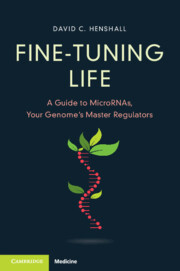Book contents
- Fine-Tuning Life
- Reviews
- Fine-Tuning Life
- Copyright page
- Dedication
- Contents
- Figures
- Ode to the MicroRNA
- Acknowledgements
- Common Terms and Definitions
- Introduction
- Chapter 1 Discovered!
- Chapter 2 MicroRNAs Emerge as Master Controllers
- Chapter 3 Epic Journey
- Chapter 4 Opening Act
- Chapter 5 MicroRNAs Shape the Machinery of Our Minds
- Chapter 6 Centre of the Electrical Storm
- Chapter 7 MicroRNAs Become Medicines
- Chapter 8 Circulating MicroRNAs Provide a Diagnosis
- Chapter 9 Finale and Encore for MicroRNAs
- References
- Index
Chapter 4 - Opening Act
Fine-Tuning During Development
Published online by Cambridge University Press: 14 June 2024
- Fine-Tuning Life
- Reviews
- Fine-Tuning Life
- Copyright page
- Dedication
- Contents
- Figures
- Ode to the MicroRNA
- Acknowledgements
- Common Terms and Definitions
- Introduction
- Chapter 1 Discovered!
- Chapter 2 MicroRNAs Emerge as Master Controllers
- Chapter 3 Epic Journey
- Chapter 4 Opening Act
- Chapter 5 MicroRNAs Shape the Machinery of Our Minds
- Chapter 6 Centre of the Electrical Storm
- Chapter 7 MicroRNAs Become Medicines
- Chapter 8 Circulating MicroRNAs Provide a Diagnosis
- Chapter 9 Finale and Encore for MicroRNAs
- References
- Index
Summary
MicroRNAs were discovered during experiments designed to learn how genes coordinate animal development. This chapter begins with the early studies that taught us the importance of microRNAs for mammalian development by studying what happened when key genes were deleted in mice. It ranges from studies that knocked out genes from the entire organism towards refined approaches that removed microRNAs at defined moments from specific tissues, including the heart and the visual system. A detailed review is taken of the genes that microRNAs regulate during brain development and their contribution to the diversity of cell types. These studies reveal the essential role for the microRNA system broadly, as well as how certain developmental events are more or less tolerant of disruption to the microRNA system. This chapter also reviews which microRNAs are the first to control gene activity after fertilisation and how environmental and parental experience can change microRNA activity. The chapter also includes explanations of the scientific toolkit needed to delete or deliver biogenesis components and microRNA genes, and how microRNAs have been used as tools in stem cell research.
Keywords
- Type
- Chapter
- Information
- Fine-Tuning LifeA Guide to MicroRNAs, Your Genome's Master Regulators, pp. 76 - 107Publisher: Cambridge University PressPrint publication year: 2024

